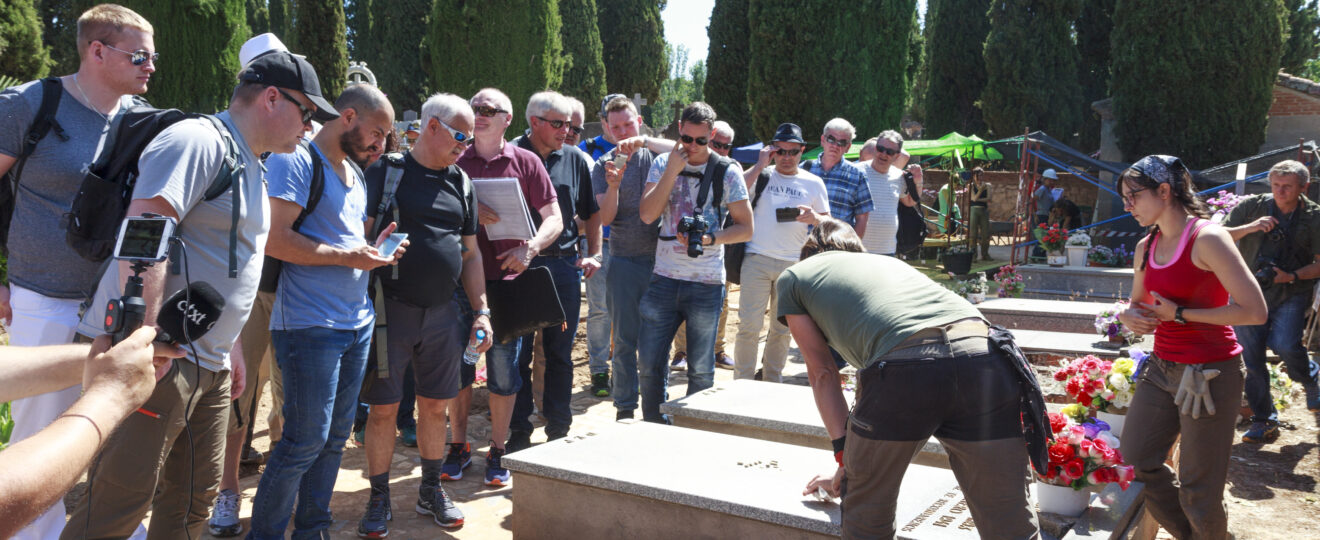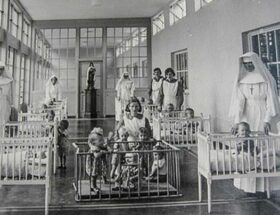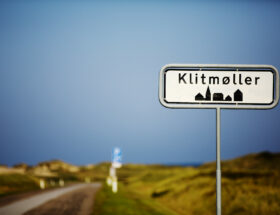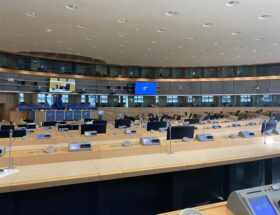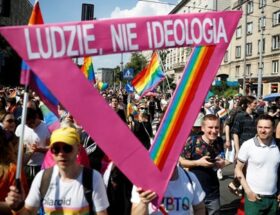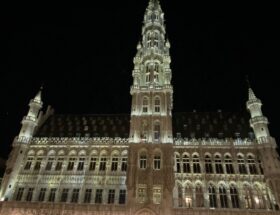The ARHM reads the names on a mass grave in Guadalajara to Norwegian members of the Rogaland Elektromontørforening district office of ELogIT in 2017. // CREDIT: Svenn Åge Johnsen
The Norwegian trade union ELogIt has offered financial aid to the Spanish Association for the Recovery of Historical Memory since 2012, in order to open mass graves from the Spanish Civil War. This connection is built on solidarity and the fight against fascism.
BY: Itsaso Jauregui Gurucharri and Maia Galmés Feuer
It is 2012. Members of the Norwegian trade union ELogIt visit Spain, intending to meet with some trade unions to study the impact of the 2008 economic crisis on the country. There they come across a reality that shocks them: Spain is the second country in the world with the most forced disappearances and mass graves, only behind Cambodia.
In order to get a better idea of the situation, they meet with the Spanish Association for the Recovery of Historical Memory (ARHM) . They find out that the association is working with families who are still looking for the remains of their disappeared relatives who were killed in the Spanish Civil War. This information is so shocking to them that when they return to Norway they decide that they cannot look the other way.
A union of people against fascism
Today ELogIT is the fifth biggest union in Norway, with approximately 40.000 members who work in telecommunications, electrical engineering, energy and IT areas.
They focus on guaranteeing fair pay and working conditions for their members through collective agreements and bargaining, juridical help and general support on a daily basis, as they describe in their website. Their main office is located in the centre of Oslo where they share the building with other unions, but they also have 13 local offices throughout the country that work for the same aims.

According to the last database sourced from the Organisation for Economic Co-operation and Development, in 2019 more than half of Norway’s employees were affiliated with a trade union. This is not a surprising number when taking into account that the Nordic countries have the highest union density in the world, and that it is basically set as default in the Scandinavian working lifestyle.
The members, therefore, are located in different parts of the country that can be far away and then hard to manage by the center office in Oslo. This is why their power and influence is horizontal and shared equally by the regional smaller offices and the main union building in the capital city.
Members pay 1,2 percent of their gross monthly salary to the union and sign-up through an online application in order to get access to assistance concerning working conditions and wages, and fair addressment in labour disputes. The union also provides legal aid free of charge when necessary, and an insurance program that covers their household contents.
Aside from the stated benefits, which are fairly general in terms of trade union functions, ELogIT has also been giving support to causes that they find important. One example is the case of Honduras.

“International solidarity is one of the basic principles for the trade union movement around the world, but especially in Norway”, explained Jan Olav Andersen, the current president and director of the union.
This is why in ELogIT they also use their money for solidarity reasons, as it is seen in their support towards the ARHM in Spain, which works to open mass graves in order to recover missing bodies which date back to the civil war.
A look back in history
The connection between two seemingly distant countries is not random, as their paths crossed in the Spanish Civil War back in 1936.
In the war, the nationalist and Francoist side had the support of Germany and Italy, while the leftist and Republican side had the Soviet Union and Mexico. The Republicans also received civil aid from more than fifty countries. This aid was concentrated in military units composed of foreign volunteers, also known as the International Brigades. Between 40.000 and 60.000 volunteers fought against Franco and it is estimated that 200 of them were Norwegian.
“If the Spanish people hadn’t resisted fascism, the history of Europe would have been totally different. People from all over the world saw that the Republicans were fighting, they saw the destruction”, said Henning Solhaug, a member of various local offices of ELogIt and organizer of the visits conducted by the Arven Etter Franco.
When Francoists won the war in 1939, a period of free persecution and cruelty against the Republicans began, and that was when almost half a million of them fled the country. That same year marked the start of the Second World War, and the Republican exiles continued to show their support for the Allied troops by fighting against fascism in other countries.
Besides, they did not forget the support received in the civil war by the Norwegian brigades, and they travelled to Norway in order to help them fight against the Nazis. Bonifacio Sánchez, the spokesperson of the ARHM, states that in the Norwegian resistance brigade there were 2,000 volunteers, and 1,000 of them were Spanish.

“The Norwegians saw it not only as a fight against fascism but as a struggle to achieve their own identity, so they feel infinitely grateful to the Spaniards who were there”, explained Sánchez.
One of the battles in which the presence of the Republicans was noted was in Narvik, a town in the north of Norway, in 1940. Many of the Republicans who exiled to France had enlisted in the 13th Demi-Brigade of the Etrángere Légion with the intention of combating fascism in other countries.
In April and June 1940 this brigade fought three battles in Narvik alongside Allied forces and in the second one, which took place on 13 April, the Nazis were defeated for the first time since the start of the war. The brigade was finally defeated by Germany in June of that same year and the names of the ones who lost their lives in that battle are listed in the Narvik war cemetery.

“There are many Spaniards who are buried in the cemetery of Narvik. These are things unknown from history and will probably stay like this forever, as no one has ever taken care of them again”, said Bonifacio Sánchez.
Payback
Payback is the word that Henning Solhaug, the main driver and organizer of this project, chose to explain the reasons behind this initiative:
“We betrayed the Spanish democrats because we didn’t support the Republic and then they were betrayed again during the Cold War period. They were waiting for the liberation of Spain and that never happened, so we owe them for that. Helping them is a kind of payback”, explained Solhaug.
Between 5,000 and 10,000€ a year and periodic visits to witness openings of mass graves. This is what the regional trade union office members have been giving Spain since 2012, when the ELogIT workers were deeply shocked by the purpose of the ARHM.
“We got involved in this project by a coincidence: we were there, we met them and we were touched by their story”, explained Andersen.
Since Solhaug originally presented this project to the committee, which is the highest ELogIT decision-making body, it has been reapproved in every one of their meetings, held every fourth year, the last one being in 2019. To this day, they have given the ARHM an approximate amount of 70,000€, according to Solhaug, enabling the opening of several mass graves.

But aside from this amount, some district branches of ELogIT such as the one in Rogaland and Vestland, along with other trade unions such as the Union of Employees in Commerce and Offices (HK) have gathered under the group Arven Etter Franco to also give amounts of money directly to the ARHM over these past years. Still, their main purpose has been to organize trips to Spain to witness and support the grave openings with their presence, as Svenn Åge Johnsen, the high secretary of the Rogaland Elektromontørforening district office of ELogIT, explained.
“It is not only about the money. I want this to be more than just helping them, because I think the Spaniards are helping us as well, as there is a lot to learn from Spain. History is repeating itself, and by visiting the grave openings we can bring back what happened and what’s happening in Spain right now to learn from it” stated Johnsen.
These visits and the majority of the support to the ARHM is conducted by the local offices of ELogIT, rather than the central one, as both Solhaug and Johnsen detailed.
Over these past years and with the rise of several right-wing parties and ultra conservative political trends across Europe, the Norwegian trade unionists feel that this is a way of making people aware and conscious of what fascism is, as according to both Solhaug and Andersen, it is coming back:
“We use this story not only to support the workers in Spain but also to tell our members that the danger isn’t over, it’s present in our own time”, described Andersen.

When talking about the knowledge of this project among ELogIT members, Andersen explains that the amount of money that they supply to this cause is not enough to create any fuss, and that there is a general acceptance that they are not only working for themselves, but also for other people around the world:
“There is a limit to where our members would complain, but most of them are aware that the trade union is a political organisation concerned about society, justice and the world. We are something more than just a union who takes care of itself”, he explained.
He also describes that they have never received any official reactions to this initiative from Spain, and this could also be due to the amount of money that they grant to the ARHM:
“This is one of the benefits to the fact that the sums are not that big. If it were millions of euros, that could happen”, he stated.
Also, when talking about the Spanish handling of the situation, the president of ELogIT remarks that he does not intend to interfere with Spanish politics, but that it seems from the outside that they have not done enough to move forward from their history as a long term fascist state:
“In Spain, compared to other places where they have talked about it and dealt with the wounds, they have been interested in not opening them, although they are open. If you transfer that into the bigger picture of fascism, then it becomes dangerous. Most people in Europe haven’t grown up or even lived in a period of fascism, so it’s very important to tell the story again and again, because as we say about Hitler, he is dead but he won’t lay down”, described Andersen.
Not Norway-Spain, just solidarity
Having the Nobel Peace Prize awarded in Oslo and chosen by a Norwegian committee is a random historical choice, but it matches with the traditional Norwegian solidarity.
The workers from the trade union insist that the initiative to give money to Spanish families does not come from a connection between Norway and Spain. This is a project of solidarity between two groups of people in different countries who resemble each other.
“The exiled Republicans who fought in Norway were from the working class, the majority of them from trade unions. Norway is not helping, we are a small part of a trade union, and we do it on our own”, explained Henning Solhaug.
Jan Olav Andresen, from the central ELogIT office also mentions the word obligation, in the sense of having the means to help, and therefore the duty to do so:
“The richer you are, the larger responsibility you have, and we are on the top. In Norway, I think we have a certain obligation to help, as we have the resources to do so”, he specified.
National shame
“In the 21st century it can’t be fashionable to be left-wing. Leftists only talk about their grandfathers’ war, about the pits of who knows who and about historical memory, it’s their only topic”, stated Pablo Casado in 2015, the now president of the right-wing People’s Party, the second party with more votes in the last Spanish elections.
The mass grave openings is a very controversial topic in Spanish society, and it is always an object of debate during the elections by the different political parties. The phrase “closing wounds” is commonly used in this context, arguing that conducting those exhumations and giving the remains to the respective relatives is a way of leaving the past behind. However, Henning Solhaug, does not completely agree with this statement:
“It is not possible to close wounds like that. Even though you are excavating the bodies, wounds will be there, but that way you can at least heal the grief and desperation that people feel because they lost their relatives”, he said.
After Franco’s death in 1975, efforts were made to leave the past behind and to make a smooth transition to democracy. In 1977, both left and right-wing parties signed the Amnesty Law, also known as the Pact of Oblivion. This pact ensured that there were no prosecutions for those responsible for the crimes of the dictatorship, going against the transition principles.

In 2007 a small change happened when The Law of Historical Memory was published. This law sought to establish measures for those who suffered persecution or violence during the Civil War and the Dictatorship. Its terms were unclear but one thing was for certain: opening mass graves was not allowed.
“When that law mentions victims of war, it refers to the victims on both sides, including those who disappeared on the war front, who do not have the same characteristics as those who disappeared forcibly. According to the United Nations, a forced disappearence is the worst crime that can be committed because it involves abduction, torture, murder and concealment of the body”, stated Bonifacio Sánchez.
The latest juridical change was presented last year as a project called Democratic Memory Law, which had the intention to offer economic, social and material help to the recovery of the remains. However, the ARHM refused to receive money from the government, arguing that human rights should not be subsidized, but guaranteed:
“We don’t want the government’s help, what we really want is for them to take care of it. We don’t want to keep doing this. I hope that one day we can tell the Norwegians that we don’t need their help anymore because the State is finally taking care of everything”, said Bonifacio Sánchez.
The clearest symbol of the wounds of the Civil War and the Dictatorship is reflected in the Valley of the Fallen, a monument that was built in 1939. Franco wanted to pay tribute to those who died by his side during the war and he used 20,000 Republican prisoners to build it. Under that 150-meter cross is the largest mass grave in Spain, where the remains of more than 33,000 Republicans are located, and inside, buried with honor, are the cause of the massacre. Franco was buried there until 2019.

“Why are these things happening in Spain? Why was Franco exhumated with state honours? Franco’s casket was moved to a pantheon that is considered of national heritage and that we are all paying for. These peculiarities are terrifying. They’re trying to make this issue die, but the memory still lives on”, states Bonifacio Sánchez.
